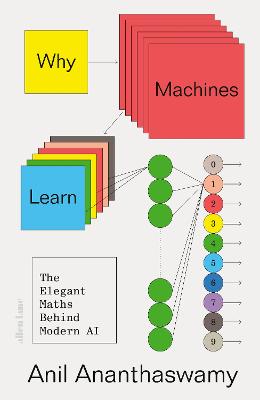
Why Machines Learn
Anil Ananthaswamy
£30.00
Description
‘An invaluable companion for anyone who wants a deep understanding of what’s under the hood of often inscrutable machines’ Melanie Mitchell
A rich, narrative explanation of the mathematics that has brought us machine learning and the ongoing explosion of artificial intelligence
Machine-learning systems are making life-altering decisions for us: approving mortgage loans, determining whether a tumour is cancerous, or deciding whether someone gets bail. They now influence discoveries in chemistry, biology and physics – the study of genomes, extra-solar planets, even the intricacies of quantum systems.
We are living through a revolution in artificial intelligence that is not slowing down. This major shift is based on simple mathematics, some of which goes back centuries: linear algebra and calculus, the stuff of eighteenth-century mathematics. Indeed by the mid-1850s, a lot of the groundwork was all done. It took the development of computer science and the kindling of 1990s computer chips designed for video games to ignite the explosion of AI that we see all around us today. In this enlightening book, Anil Ananthaswamy explains the fundamental maths behind AI, which suggests that the basics of natural and artificial intelligence might follow the same mathematical rules.
As Ananthaswamy resonantly concludes, to make the most of our most wondrous technologies we need to understand their profound limitations – the clues lie in the maths that makes AI possible.
Publisher Review
After just a few minutes of reading Why Machines Learn, you’ll feel your own synaptic weights getting updated. By the end you will have achieved your own version of deep learning – with deep pleasure and insight along the way — Steven Strogatz Anil Ananthaswamy’s Why Machines Learn embarks on an exhilarating journey through the origins of contemporary machine learning. With a captivating narrative, the book delves into the lives of influential figures driving the AI revolution while simultaneously exploring the intricate mathematical formalism that underpins it. As Anil traces the roots and unravels the mysteries of modern AI, he gently introduces the underlying mathematics, rendering the complex subject matter accessible and exciting for readers of all backgrounds — Bjoern Ommer Some books about the development of neural networks describe the underlying mathematics while others describe the social history. This book presents the mathematics in the context of the social history. It is a masterpiece. The author is very good at explaining the mathematics in a way that makes it available to people with only a rudimentary knowledge of the field, but he is also a very good writer who brings the social history to life — Geoffrey Hinton If you were looking for a way to make sense of the AI revolution that is well underway, look no further. With this comprehensive yet engaging book, Anil Ananthaswamy puts it all into context, from the origin of the idea and its governing equations to its potential to transform medicine, quantum physics-and virtually every aspect of our life. An essential read for understanding both the possibilities and limitations of artificial intelligence — Sabine Hossenfelder Why Machines Learn is a masterful work that explains – in clear, accessible, and entertaining fashion – the mathematics underlying modern machine learning, along with the colorful history of the field and its pioneering researchers. As AI has increasingly profound impacts in our world, this book will be an invaluable companion for anyone who wants a deep understanding of what’s under the hood of these often inscrutable machines — Melanie Mitchell Generative AI, with its foundations in machine learning, is as fundamental an advance as the creation of the microprocessor, the Internet, and the mobile phone. But almost no one, outside of a handful of specialists, understands how it works. Anil Ananthaswamy has removed the mystery by giving us a gentle, intuitive, and human-oriented introduction to the math that underpins this revolutionary development — Peter E. Hart
Find this book on the following lists
-
July 2024 New Releases: Science
Browse The List
Book experts at your service
What are you looking for?
